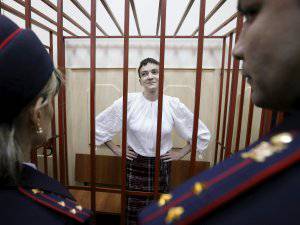Savchenko law could result in large numbers of prisoners released

If signed into force, Nadiya Savchenko’s first legislative initiative as MP could result in up to one in five prisoners being released, however there could also be some more negative consequences. .

Nadiya Savchenko has been an MP now for over a year, but this was her first draft bill. The reason hardly needs to be elaborated since Russia has been illegally holding the ex-military pilot in detention since she was forcibly taken from Ukraine by Kremlin-backed militants in June 2014.
Bill No. 3413 was adopted in full on Nov 26, and now awaits the President’s signature. It was drawn up by Savchenko, together with five MPs from different factions.
The bill proposes amendments to Article 75 § 5, according to which one day in SIZO or a pre-trial detention centre counts as 2 days served in a prison colony. At present, if a person has spent 6 months in SIZO, and is sentenced to 3 years, he serves a further two and a half years. If President Petro Poroshenko does not veto the law, from now on they would have to serve a further two years.
The justification for this change is that the conditions in SIZO are significantly worse than in a prison colony, with people who have not been convicted of any crime are held in overcrowded cells, without poor and insufficient food, etc.
The bill also asserts that it is aimed at reducing the time spent in SIZO and the amount of money spent on this, and here there are reservations, as Delovaya Stolitsa reports.
The reason is brutally simply. If the prosecution is convinced that a person really has committed a crime, then they would be motivated to ensure that the trial took place as soon as possible and the person received the sentence envisaged by law. Although the situation improved with the new Criminal Procedure Code, in force since 2012, there are still a lot of remand prisoners in Ukraine with the time taken before a court verdict much longer than in most European countries.
The new law, however, could encourage remand prisoners expecting a sentence to drag out proceedings in order to reduce the time in real terms. This is the view of Serhiy Starenky, former head of the State Penitentiary Service, who says it is not hard to do this, by taking a long time to read the material, lodging an appeal which they might otherwise have not, or even ‘confessing’ to crimes they didn’t commit. He points out that the new law will mean that all prisoners can expect to see their sentences reduced, including those imprisoned for very serious crimes. He believes that 15-20% of current prisoners could hope to be released already, after their sentence time was thus recalculated.
There could also be a flood of applications to the President for a pardon from life prisoners who can only ask for this after serving 15 years.
Lawyer Taras Bezpaly points to a potential anomaly as a result of this law. At present, people are only placed in SIZO if charged with a crime carrying a sentence of over 5 years. As a result of the new norm, the actual sentence, if passed, could end up being lower than a person sentenced to a real term of imprisonment but who was never placed in SIZO since the impugned crime was considered less serious. People remanded in custody on the grounds that they will otherwise abscond or not respond when summoned for questioning will also be in a better position.
Bezpaly also rejects the suggestion that the law will result in people spending less time in SIZO. At present a person can be held for a maximum of 6 months on minor or medium seriousness charges and 12 months if accused of a serious or particularly serious crime.
That, however, is the theory with the practice quite different, with people held for years. The version of the bill as it now stands does nothing to prevent this, with the aim rather at reducing the time a person spends as a convicted prisoner, Bezpaly notes.
Ukraine, it should be noted, has an extremely low number of acquittals, and at least up till recently few judges wanted to go against the public prosecutor. Cases fairly often get dragged out with people who have not been convicted, and therefore remain innocent, held in detention.
Halya Coynash




